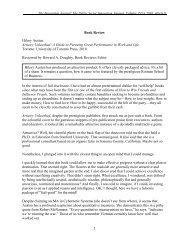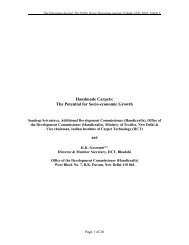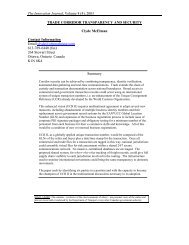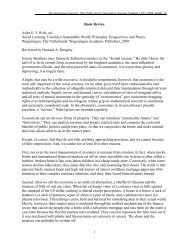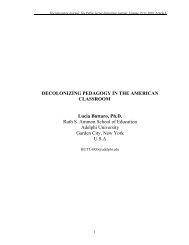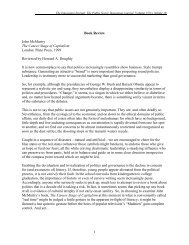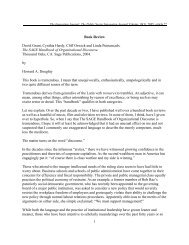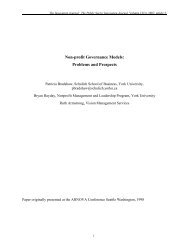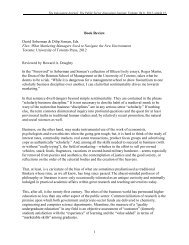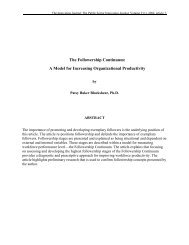Metropolitan Governance: Conflict, Competition and Cooperation
Metropolitan Governance: Conflict, Competition and Cooperation
Metropolitan Governance: Conflict, Competition and Cooperation
You also want an ePaper? Increase the reach of your titles
YUMPU automatically turns print PDFs into web optimized ePapers that Google loves.
The Innovation Journal: The Public Sector Innovation Journal Volume 10(3), 2005, article 12.<br />
<strong>and</strong> practitioners of municipal politics. Tension between those who seek greater centralization in the<br />
name of efficiency <strong>and</strong> those who prefer decentralization in the quest for community responsiveness<br />
is just one of the major issues that confront authorities <strong>and</strong> citizens alike. As well, funding of local<br />
administrations which are often being compelled to deal with increasingly onerous burdens without<br />
adequate fiscal support from larger levels of government present serious institutional problems.<br />
These <strong>and</strong> related matters (for example, Elaine B. Sharp’s insightful analysis of metropolitan<br />
structures <strong>and</strong> the control of the sex trade <strong>and</strong> attendant “moral” issues) are addressed in interesting<br />
ways.<br />
In the end, however, the overall impression is given that the goal of this book is to assist in achieving<br />
the Weberian-Leninist dream of a rational, legal administration of things. I, for one, think that there is<br />
something more to politics than this <strong>and</strong> that, at some point, new <strong>and</strong> currently unexpressed or<br />
suppressed interests will shake up the well considered "roadmap" to the good society. We have<br />
experienced significant adaptations in the past <strong>and</strong>, when we have, the intellectual “paradigm” that<br />
was safely in place to monitor stability proved as transitory as the political arrangements they were<br />
meant to interpret. Does anyone remember “structural-functionalism” <strong>and</strong> “systems theory”?<br />
Theoretical approaches <strong>and</strong> the actions they are meant to explain involve the identification of<br />
problems <strong>and</strong> the analysis of the customs <strong>and</strong> institutions that people use to solve them. We are all<br />
familiar with such “normal science,” as it is carried on from time to time. The point is that time can<br />
be short <strong>and</strong> unanticipated situations <strong>and</strong> participants have the capacity to redefine abruptly what<br />
count as problems rather than merely engage in the attempt to solve the ones that privileged<br />
“stakeholders” have successfully placed on the formal administrative agenda.<br />
About the Author:<br />
Howard A. Doughty teaches in the Faculty of Applied Arts & Health Sciences at Seneca College in King<br />
City, Ontario. He is a graduate of Glendon College <strong>and</strong> holds postgraduate degrees in Political Science<br />
from the University of Hawaii <strong>and</strong> York Univerity as well as in History <strong>and</strong> Philosophy from the<br />
University of Toronto. He has been Book Review Editor of The Innovation Journal since 1998, <strong>and</strong> was<br />
the editor of Bridges: Explorations in Science, Technology <strong>and</strong> Society (1986-1991) <strong>and</strong> The College<br />
Quarterly (1992-1997), where he continues as Book Review editor as well.<br />
3




